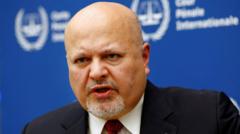The discourse around the allegations intensified after Khan's aspirations for arrest warrants against Israeli leaders concerning war crimes related to the ongoing Gaza conflict. Although the allegations predate these requests, they have surfaced at a time when the ICC is experiencing significant scrutiny. Specifically, the allegations have drawn attention to how the court deals with internal misconduct claims while managing its primary judicial responsibilities.
President of the ICC’s Assembly of States Parties (ASP), Paivi Kaukoranta, highlighted the IOM's findings, stating the organization recommended measures to uphold the rights of all involved. However, concerns were voiced regarding the IOM's efficiency, particularly from the alleged victim about the body's capability to manage such investigations properly.
In light of the situation, Khan expressed a sense of sadness upon learning that the accusations would be publicized, reiterating that there is "no truth to suggestions of such misconduct." He described the allegations as part of broader attacks on himself and the ICC, which is currently grappling with internal disputes on how to handle these serious claims, notably during a critical phase of the court's operations.
As the scrutiny heightens, the ICC reinforces its zero-tolerance policy toward harassment and misconduct to assure the safeguarding of all individuals involved, while the investigation unfolds against a backdrop of pressing international legal proceedings related to the Gaza conflict.
President of the ICC’s Assembly of States Parties (ASP), Paivi Kaukoranta, highlighted the IOM's findings, stating the organization recommended measures to uphold the rights of all involved. However, concerns were voiced regarding the IOM's efficiency, particularly from the alleged victim about the body's capability to manage such investigations properly.
In light of the situation, Khan expressed a sense of sadness upon learning that the accusations would be publicized, reiterating that there is "no truth to suggestions of such misconduct." He described the allegations as part of broader attacks on himself and the ICC, which is currently grappling with internal disputes on how to handle these serious claims, notably during a critical phase of the court's operations.
As the scrutiny heightens, the ICC reinforces its zero-tolerance policy toward harassment and misconduct to assure the safeguarding of all individuals involved, while the investigation unfolds against a backdrop of pressing international legal proceedings related to the Gaza conflict.




















